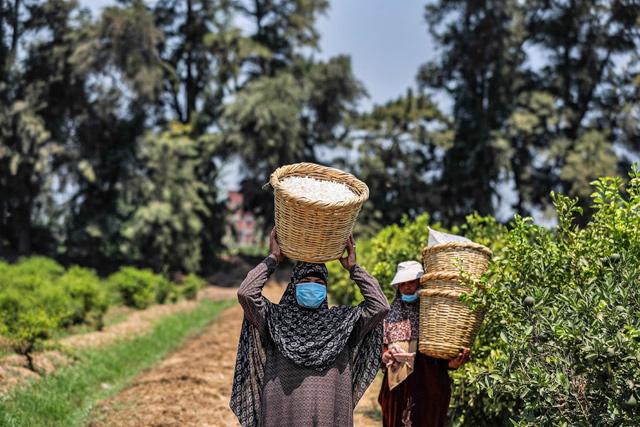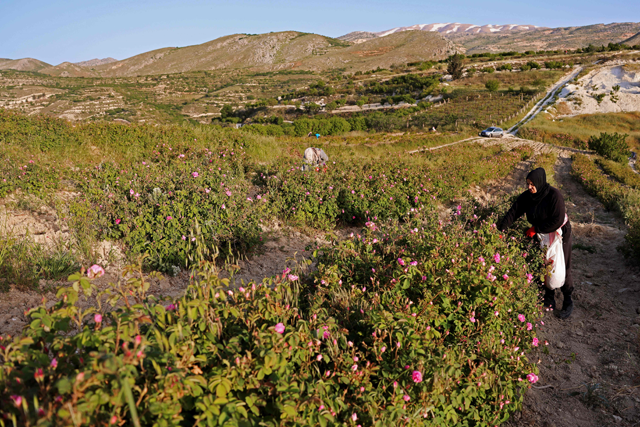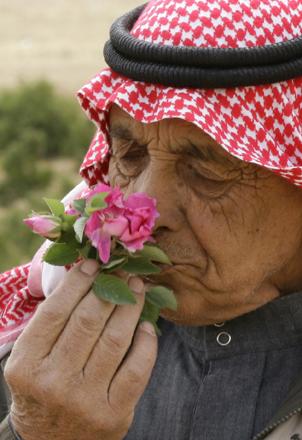You are here
Egypt's blossoming trade in fragrant jasmine flowers
By AFP - Aug 25,2020 - Last updated at Aug 25,2020

A worker, mask-clad due to the COVID-19 coronavirus pandemic, holds on her head a wicker basket filled with harvested jasmine flowers in a field at the village of Shubra Beloula in Egypt's northern Nile delta province of Gharbiya, on July 23 (AFP photo)
SHUBRA BELOULA, Egypt — At midnight, Eman Mehanna switches on her headlamp and begins her day's work picking jasmine flowers, as their powerful fragrance wafts far across the fields in Egypt's fertile Nile Delta.
Egypt's Gharbiya region is the heartland of its jasmine harvest. The aromatic oils extracted for perfumes from here make up over half the global supply, according to international trade figures.
"We have been picking jasmine since we were children," Mehanna said, gathering blossoms by hand in the village of Shubra Beloula, around 100 kilometres north of the capital Cairo.
The white petals, plucked from densely-packed rows of chest-high green bushes of "royal jasmine" — Jasminum grandiflorum — burst out of her wicker basket.
During the harvest season from June until November, picking begins around midnight and finishes a few hours after dawn each day.
It is a tough job, but a hard-working picker can harvest as much as 5 kilogrammes of petals a day.
While it is cooler to work after dark, the key reason harvesting is done at night is because it is only then that the flowers fully open.
"You really need to concentrate on looking for the blossoming flowers," Mehanna said. "We leave the closed ones for the following day."
After dawn, she swaps her headlight for a hat to shade her from the burning sun.
Petals to paste
Egypt and India dominate the production of jasmine extract for perfumes, making up around 95 per cent of supply, according to the International Federation of Essential Oils and Aroma Trades (IFEAT).
Jasmine trade is estimated to pull in some $6.5 million annually for Egypt, providing income to around 50,000 people, IFEAT says.
In Egypt, more than 90 per cent of jasmine fields are in Gharbiya governorate, fed by the rich minerals and waters of the Nile, shortly before the river reaches the Mediterranean Sea.
Farming is concentrated in the neighbouring districts of Qutur — where the village of Shubra Beloula is located — and Basyoun, otherwise famous as the birthplace of Egyptian and Liverpool football star Mohamed Salah.
On either side of a dusty road are lush green fields dotted with gleaming white flowers.
Early in the morning, the pickers unload their baskets into crates, which are then stacked high onto pickup trucks and taken for processing.
The Fakhry essential oils factory handles around 70 per cent of the region's floral production.
One of the first steps is to compress and grind the delicate blossoms down.
From that paste, the precious scented oils can be extracted by distillation.
"This was the first essential oils factory established in Egypt," factory floor manager Badr Atef told AFP, as he supervised the weighing and handing over of petal-packed crates.
Tough work
The scent of flowers is intense.
According to Atef, factory owner Ahmed Fakhry was inspired to farm jasmine when, as a young student in the 1960s, he visited the town of Grasse, the birthplace of French perfumes, on the Cote d'Azur.
Returning to Egypt, Fakhry introduced his new perfume knowledge and set up commercial jasmine farming and processing.
"Now 20 tonnes of jasmine flowers are picked daily" in Egypt, Atef said, estimating that some 400 hectares of the scented plant are farmed in the Gharbiya region.
From all those flowers, some 5 tonnes of dense jasmine paste is finally produced each year.
Egyptian farmers have long complained that the low production costs of their big rival India drive their prices down.
But the economic impact of the novel coronavirus pandemic has been harder still, with demand dropping sharply, farmers said.
Picking flowers is back-breaking work.
"Stand in the sun for a couple of minutes, and you'll see how hard this job is," said 60-year-old picker Waafa, who refused to harvest flowers this year because prices were too low.
Even on a good year, some pickers earn little more than a couple of dollars a day for hours of work, income Waafa slammed as "measly".
"Everything is expensive nowadays," she said.
But others say that jasmine-picking season is a time they enjoy.
"The sweetness is when we're all together picking," said Mehanna. "We swap stories and have fun."
Related Articles
QSARNABA, Lebanon — On a gentle slope looking out over Lebanon’s Bekaa Valley, villagers work their way across pink-dotted terraces, g
By Sophie PonsAgence France-PresseKELAAT MGOUNA, Morocco — To earn a dollar, rose picker Izza in Morocco's Atlas Mountains wakes up at dawn
DAMASCUS — Its fame is such that the damask rose features in Shakespeare, but for Syrian farmers growing the flower that produces the heady-













